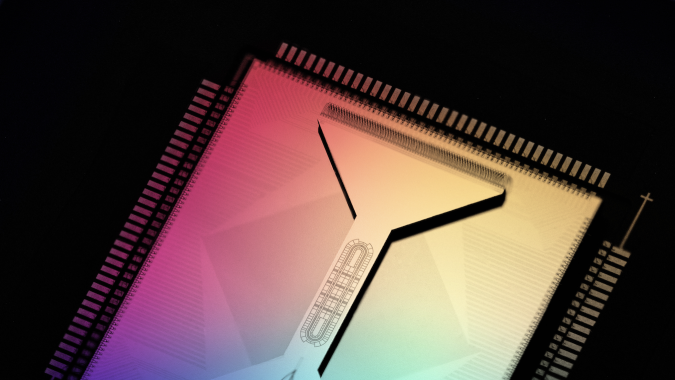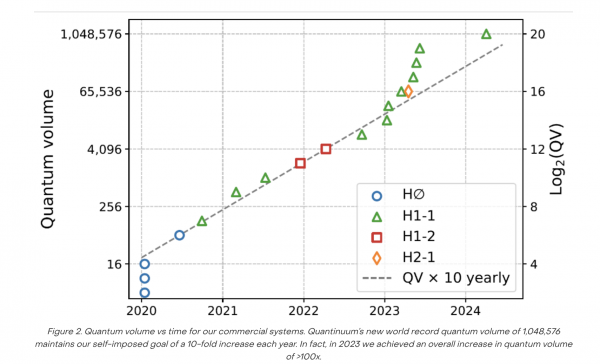March and April have been good months for Quantinuum, which today released a blog announcing the ion trap quantum computer specialist has achieved a 99.9% (three nines) two-qubit gate fidelity on its H1 system. The latest news follows other advances made in collaboration with Microsoft on error correction and delivery of logical qubits.
Here an excerpt from today’s blog, written by lyas Khan, founder and chief product officer, and Jenni Strabley, sr director of offering management:
“Quantinuum has become the first company ever to achieve “three nines” in a commercially-available quantum computer, with the first demonstration of 99.914(3)% 2-qubit gate fidelity, showing repeatable performance across all qubit pairs on our H1-1 system that is constantly available to customers. This production-environment announcement is a marked difference to one-offs recorded in carefully contrived laboratory conditions. This demonstrates what will fast become the expected standard for the entire quantum computing sector.
“Quantinuum is also announcing another milestone, a seven-figure Quantum Volume (QV) of 1,048,576 – or in terms preferred by the experts, 220 – reinforcing our commitment to building, by a significant margin, the highest-performing quantum computers in the world. These announcements follow a historic month that started when we proved our ability to scale our systems to the sizes needed to solve some of the world’s most pressing problems – and in a way that offers the best path to universal quantum computing.”
As noted in the blog, gate fidelity and error correction go hand-in-hand, or put another way, you can’t have one without the other.
“Our record two-qubit gate fidelity of 99.914(3)% marks a symbolic inflection point for the industry: at ”three nines” fidelity, we are nearing or surpassing the break-even point (where logical qubits outperform physical qubits) for many quantum error correction protocols, and this will generate great interest among research and industrial teams exploring fault-tolerant methods for tackling real-world problems, wrote Kahn and Strabley.
“Without hardware fidelity this good, error-corrected calculations are noisier than uncorrected computations. This is why we call it a “threshold” – when gate errors are “above threshold”, quantum computers will remain noisy no matter what you do. Below threshold, you can use quantum error correction to push error rates way, way down, so that quantum computers eventually become as reliable as classical computers.”
Other notable recent Quantinuum news included:
- On March 5th, 2024, Quantinuum researchers “disclosed details of our experiments that provide a solution to a totemic problem faced by all quantum computing architectures, known as the wiring problem. Supported by a video showing qubits being shuffled through a 2-dimensional grid ion-trap, our team presented concrete proof of the scalability of the quantum charge-coupled device (QCCD) architecture used in our H- Series quantum computers.”
- On April 3rd, 2024 in partnership with Microsoft, “our teams announced a breakthrough in quantum error correction that delivered as its crowning achievement the most reliable logical qubits on record. We revealed detailed demonstrations in an arXiv pre-print paper of the reliability achieved via 4 logical qubits encoded into just 30 physical qubits on our System Model H2 quantum computer. Our joint teams were able to demonstrate logical circuit error rates far below physical circuit error rates, a capability that our full-stack quantum computer is currently the only one in the world with the fidelity required to achieve.”
Dave Hayes, a Senior R&D manager at Quantinuum, is quoted in the blog saying, “Getting to three 9’s in the QCCD architecture means that ~1000 entangling operations can be done before an error occurs. Our quantum computers are right at the edge of being able to do computations at the physical level that are beyond the reach of classical computers, which would occur somewhere between 3 nines and 4 nines. Some tasks become hard for classical computers before this regime (e.g. Google’s random circuit sampling problem) but this new regime allows for much less contrived problems to be solved. At that point, these machines become real tools for new discoveries – albeit they will still be limited in what they can probe, likely to be physics simulations or closely related problems.”
“Additionally, these fidelities put us, some would say comfortably, within the regime needed to build fault-tolerant machines. These fidelities allow us to start adding more qubits without needing to improve performance further, and to take advantage of quantum error correction to improve the computational power necessary for tackling truly large problems. This scaling problem gets easier with even better fidelities (which is why we’re not satisfied with 3 nines) but it is possible in principle,” said Hayes.



























































